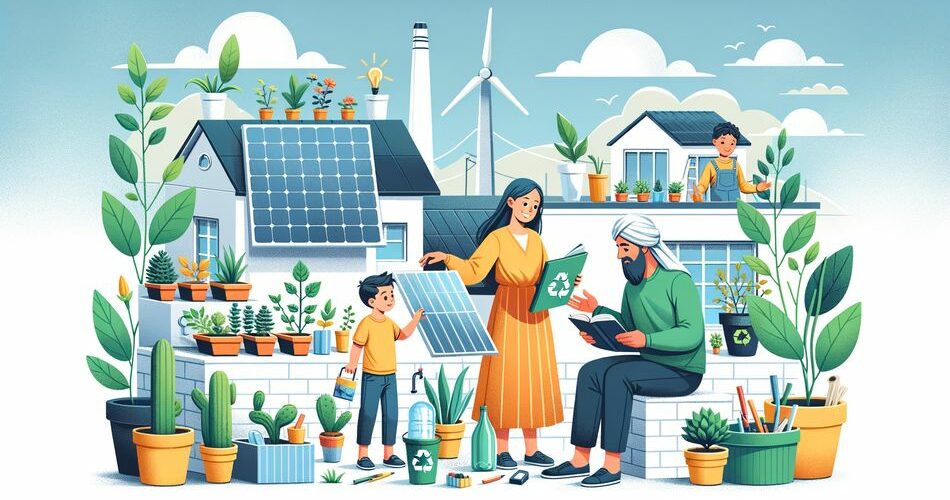Welcome to another insightful post here at Growing Together, where our mission is to provide you with expert parenting tips and child development advice. Today, we’re diving into a vital topic that intersects both parenting and environmental stewardship: “Parenting with Purpose: Navigating the World of Sustainable Living with Your Kids.” Raising the next generation goes beyond nurturing; it’s about instilling values that will help shape a better future. Let’s explore how you can integrate sustainable living practices into your family life, creating a nurturing and conscientious environment for your children.
Why Sustainable Living Matters in Parenting
Sustainable living is not just a buzzword; it’s a necessity. As parents, our responsibility extends beyond providing for our children’s immediate needs. We must also think long-term about the kind of world they will inherit. Teaching children about sustainability helps them understand the importance of conserving resources, reducing waste, and preserving the planet. This foundation will equip them to make environmentally conscious decisions as they grow up. Moreover, living sustainably together as a family can foster a sense of responsibility and unity, as everyone works towards a common goal.
Starting with Simple, Everyday Changes
When it comes to sustainable living, small daily habits can make a big difference. Here are some simple changes you can introduce to your family:
- Reduce, Reuse, Recycle: Begin with the basics by educating your kids about the three R’s. Make recycling a fun family activity and explain why it’s important.
- Conserve Energy and Water: Teach your children to turn off lights when they leave a room and not to leave the tap running while brushing their teeth.
- Use Reusable Items: Swap single-use plastics for reusable water bottles, shopping bags, and food containers. Let your kids pick their own reusable items to create excitement.
Engaging Kids in Sustainable Activities
Children learn best through hands-on activities. Here are some ways to engage them in sustainable living:
- Gardening: Start a small garden in your backyard or use pots if space is limited. Teach them about growing their own food and composting kitchen waste. This activity not only promotes sustainability but also teaches responsibility and patience.
- Nature Walks: Take regular family trips to parks or nature reserves. Discuss the importance of preserving these natural habitats and the wildlife that depends on them.
- DIY Projects: Encourage creativity by repurposing old items into new crafts or toys. This can help children see the value in giving new life to things that might otherwise be thrown away.
Educational Resources and Tools
There are numerous resources available to help parents teach their children about sustainable living. From books and documentaries to interactive websites, these tools can make learning about sustainability engaging and fun:
- Books: Look for children’s books that focus on environmental themes. Titles like “The Lorax” by Dr. Seuss and “The Earth Book” by Todd Parr are great starting points.
- Documentaries: Watching documentaries together, such as “Planet Earth” or “The Blue Planet,” can spark meaningful conversations about the environment.
- Online Resources: Websites like the Environmental Protection Agency (EPA) and National Geographic Kids offer educational games, articles, and activities tailored for young audiences.
Creating a Sustainable Family Culture
To make sustainable living a lasting part of your family’s lifestyle, it’s essential to create a culture around it. Here’s how:
- Lead by Example: Children emulate their parents. Show your commitment to sustainability through your actions, whether it’s recycling, conserving water, or choosing eco-friendly products.
- Open Discussions: Regularly talk about why sustainability is important. Discuss current events related to the environment and how your family can make a difference.
- Set Goals: Establish family sustainability goals and celebrate when you achieve them. This could include reducing waste, conserving energy, or participating in community clean-up events.
Conclusion
Parenting with purpose means taking proactive steps to prepare your children for the future, and sustainable living is a crucial component of this journey. By integrating sustainable practices into your daily life, you not only help protect the environment but also teach your children invaluable lessons about responsibility, conservation, and the impact of their actions. As you navigate the world of sustainable living with your kids, remember that the small, consistent efforts you make today are investments in a healthier, more sustainable world for future generations.
Thank you for joining us on this important topic. Be sure to check back at Growing Together for more expert parenting tips and child development advice. Together, we can raise a generation of thoughtful, eco-conscious individuals who are ready to take on the challenges of tomorrow.

